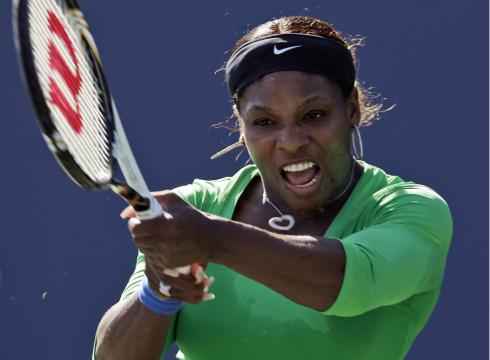
After overcoming so much, Serena Williams is back in the game. Serena’s struggle and dedication to return has impressed many, and her recent win at Stanford was thrilling to watch. When I look at relating career development strategies with athletics, I thought it would be fun to discuss some of the similarities that I have always seen between tennis and interviewing.
Here’s a few:
1. One player serves the ball and the other player returns the shot, volleying until a point is scored.
2. Sometimes the shots come fast and furious and out of reach, and others may seem easy and close – but players can still miss them.
3. The bottom line, as in any sport, in order to be triumphant, players must practice.
1. The Handshake:
Just like tennis, interviews begin and end with a handshake. How is yours? It is important to have a firm, and ideally dry handshake. Both men and women should be aware of this – I have shaken a few men’s hands in my life that were weaker than my nine year old niece’s (actually, she is pretty tough so this might not be the appropriate comparison). It is very awkward to shake someone’s hand only to find a rag doll. At the other end of the spectrum, you don’t want to crush the other person’s hand just to demonstrate how much you’ve been working out. One tip is to try to quickly sense the strength level of the other person and gauge your response to that. The best handshakes are when the shakers’ strength matches up – just like tennis.
2. Serve & Game:
The recruiter “serves” with each interview question. A successful candidate will get the ball and send it back without too much struggle. However, interviews should not be a one-sided serve-hit process. Recruiters hope candidates will have a conversation, and not simply answer each question. The perfect interview should be more like a “base line” game – don’t rush the net when you answer the questions. Take time to think through your answer before you speak – set up your shot. In the semi-finals, Sharapova was quoted after her loss, “It certainly wasn't my night. She was serving and hitting so well and I was extremely late in my reactions. I felt sluggish. It was a bad day but it's also a reminder that I need to step up.” Candidates who are not ready will struggle to keep up with the interviewer, and likely lose the match.
3. The Shots:
The game involves a mixture of difficult and easy shots. In interviewing, IF a candidate prepares it tends to be for the difficult questions, assuming they will ace the “easy” ones. The easy shots can often catch you off guard, though. An “easy shot” question such as, “So, tell me a little about yourself” may seem to be the soft, high bounce lob you’ve been waiting for to drill home a winner. Anyone could answer this question, right? Don’t get too confident. Sometimes the most embarrassingly missed tennis shots are the easy ones. A recruiter once told me that his number one stump question was, “Why did you choose to go to XYZ University?” He was amazed at how many candidates were tripped up when answering this question!
4. Practice | Practice | Practice!
A successful player will be in the ready position, anticipating the other player’s shot and preparing to send the ball back over the net. When interviewing, candidates must anticipate both the easy and the difficult questions that could be asked of them – like a player practices both forehand and backhand. Just thinking of the answers in your head is only half of the process. Practice out loud. Find a partner and have them ask you questions. Even if you have to practice on your own, you will quickly notice how different it is to speak your answers aloud. After hearing yourself respond, you may even want to argue with the chair umpire to replay the point. Now is the time to find that out, not during the actual interview.
The biggest mistake candidates make is not being well-prepared for the “interview match.” No one interviews successfully by winging it just like no one wins the match without being prepared. Williams was quoted, “I'm a better player this month than I was last month. … I've put in a lot of work and I hope it continues to pay off.” Practice always pays off. The ball is in your court – so put in the time and ensure you are prepared for your interview.

